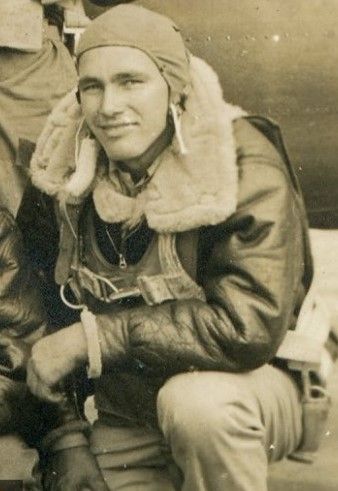 It seems Dean Trippler didn’t get along with his father, but I can understand why.
It seems Dean Trippler didn’t get along with his father, but I can understand why.Dean’s mother died when he was 6 years-old, having outlived her newborn eighth child by a mere three days.
That left Charles Trippler with seven children to take care of, ranging from 11 to 2. He did not remarry, and as a farmer, he would have been too busy keeping the roof over their heads to worry about nurturing his third son.
By the time Dean turned 16, he was living with his uncle Victor Pogue – his mother’s brother – who was only 14 years older. As Dean’s uncle, Victor filled a role in his life as a both mentor and surrogate father figure.
So when the U.S. entered World War II and Dean went in to fill out his draft card two weeks after his 18th birthday (on the last day of the Fifth Registration), he listed Uncle Victor -- not his father -- as his “person who will always know your address.”
Dean would go into the Air Force, where he served with the 763rd Bombardment Squadron in the 460th Bombardment Group. The unit was equipped with B-24 Liberators and trained in Georgia in 1943, then assigned to the Mediterranean Theater in January 1944.
Dean rose to the rank of Sergeant, and probably participated in some of the interdiction and close air support missions related to the Allied invasion of southern France (Operation Dragoon).
However, most of the squadron’s missions were strategic bombing, such as the one they began on November 11th, 1944.
That day, the 763rd took off from Spinozzola Air Field in southern Italy on a combat mission to bomb German war installations in Linz, Austria. Dean’s B-24J Liberator flew “in the #3 position in the lead box on the second attack unit.” However, the mission was “called back due to bad weather conditions,” and the planes returned to base.
 On arrival back at Spinozzola, however, both Dean’s plane (serial number 42-51737) and another (#42-51845) were missing. The squadron’s operations officer took statements from the other crews in the squadron and filed two Missing Air Crew Reports (#9747 and #9749).
On arrival back at Spinozzola, however, both Dean’s plane (serial number 42-51737) and another (#42-51845) were missing. The squadron’s operations officer took statements from the other crews in the squadron and filed two Missing Air Crew Reports (#9747 and #9749).Dean’s plane was last sighted on a course of 330 degrees at 9:10 a.m. at 23,000 feet. Missing Air Crew Report number 9749 notes that “Disappearance not known until after completion of mission,” and attributed the loss of the two aircraft to "Other: Weather Hazards."
 “Due to solid overcast conditions over the Adriatic Sea, there were no witnesses to the disappearance of the crew and aircraft.” That led the operations officer to conclude that the two planes experienced a mid-air collision approximately 24 miles southwest of the (now) Croatian island of Vis, with all crewmen lost.
“Due to solid overcast conditions over the Adriatic Sea, there were no witnesses to the disappearance of the crew and aircraft.” That led the operations officer to conclude that the two planes experienced a mid-air collision approximately 24 miles southwest of the (now) Croatian island of Vis, with all crewmen lost.For his actions in the war, Dean Tripler was awarded the Air Medal with one Oak Leaf Cluster and the Purple Heart.
Today, Dean Charles Trippler is memorialized as “Missing in Action” at the Sicily-Rome American Cemetery, along with his nine other crewmates.
 To my Grandpa Bob, he was a second cousin.
To my Grandpa Bob, he was a second cousin.To Charles Trippler, he was the only one of five sons in the military who never came home.

No comments:
Post a Comment